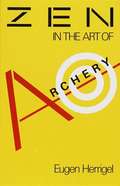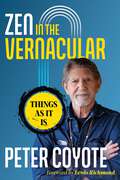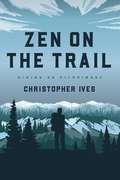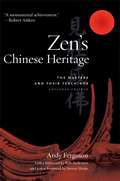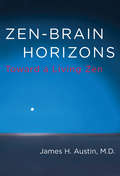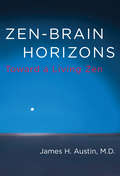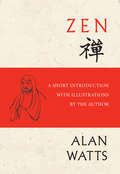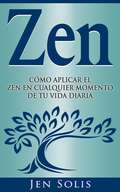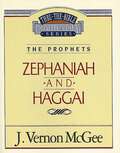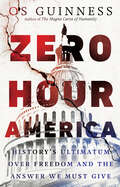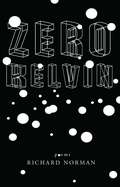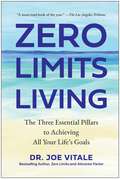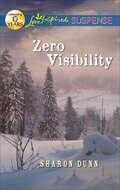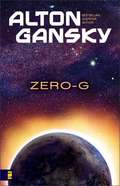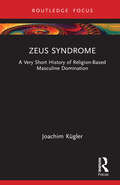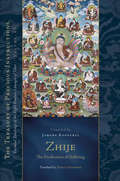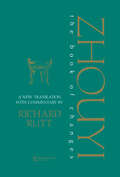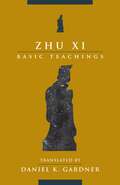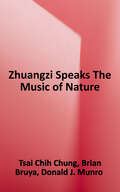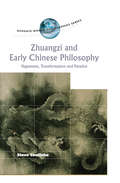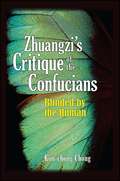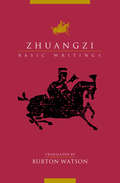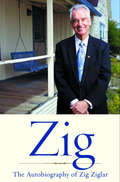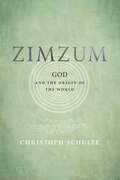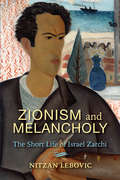- Table View
- List View
Zen in the Art of Archery
by Eugen HerrigelSince its original publication in 1953, Zen in the Art of Archery has become one of the classic works on Eastern philosophy, the first book to delve deeply into the role of Zen in philosophy, development, and practice of Eastern martial arts. Wise, deeply personal, and frequently charming, it is the story of one man's penetration of the theory and practice of Zen Buddhism. Eugen Herrigel, a German professor who taught philosophy in Tokyo, took up the study of archery as a step toward the understanding of Zen. Zen in the Art of Archery is the account of the six years he spent as the student of one of Japan's great Zen masters, and the process by which he overcame his initial inhibitions and began to look toward new ways of seeing and understanding. As one of the first Westerners to delve deeply into Zen Buddhism, Herrigel was a key figure in the popularization of Eastern thought in the West, as well as being a captivating and illuminating writer.
Zen in the Vernacular: Things As It Is
by Peter Coyote• Shows how Zen offers a creative problem-solving mechanism and moral guide ideal for the stresses and problems of daily life• Shares the author&’s secular, vernacular interpretations of the Four Noble Truths, the Three Treasures, the Eightfold Path, and other fundamental Buddhist ideasDuring the nearly 3,000 years since the Buddha lived, his teachings have spread widely around the globe. In each culture where Buddhism was introduced, the Buddha&’s teachings have been pruned and modified to harmonize with local customs, laws, and cultures. We can refer to these modifications as &“gift wrapping,&” translating the gifts of Buddha&’s teachings in ways sensible to particular cultures in particular times. This gift-wrapping explains why Indian, Tibetan, Vietnamese, Japanese, Chinese, and Indonesian Buddhism have significant differences.In this engaging guide to Zen Buddhism, award-winning actor, narrator, and Zen Buddhist priest Peter Coyote helps us peer beneath the Japanese gift-wrapping of Zen teachings to reveal the fundamental teachings of the Buddha and show how they can be applied to contemporary daily life. The author explains that the majority of Western Buddhists are secular and many don&’t meditate, wear robes, shave their heads, or believe in reincarnation. He reminds us that the mental/physical states achieved by Buddhist practice are universal human states, ones we may already be familiar with but perhaps never considered as possessing spiritual dimensions.Exploring Buddha&’s core teachings, the author shares his own secular and accessible interpretations of the Four Noble Truths, the Three Treasures, and the Eightfold Path within the context of his lineage and the teachings of his teacher and the teachers before him. He looks at Buddha&’s teachings on our singular reality that appears as a multiplicity of things and on the &“self&” that perceives reality, translating powerful spiritual experience into the vernacular of modern life.Revealing the practical usefulness of Buddhist philosophy and practice, Zen in the Vernacular shows how Zen offers a creative problem-solving mechanism and moral guide ideal for the stresses and problems of everyday life.
Zen on the Trail: Hiking as Pilgrimage
by Christopher IvesDiscover how hiking can be a kind of spiritual pilgrimage—calming our minds, enhancing our sense of wonder, and deepening our connection to nature.Evoking the writings of Gary Snyder, Bill Bryson, and Cheryl Strayed, Zen on the Trail explores the broad question of how to be outside in a meditative way. By directing our attention to how we hike as opposed to where we’re headed, Ives invites us to shift from ego-driven doing to spirit-filled being, and to explore the vast interconnection of ourselves and the natural world. Through this approach, we can wake up in the woods on nature’s own terms. In erudite and elegant prose, Ives takes us on a journey we will not soon forget. This book features a new prose poem by Gary Snyder.
Zen's Chinese Heritage
by Tenshin Reb Anderson Steven Heine Andy FergusonZen's Chinese Heritage traces twenty-five generations of inlightened Buddhist teachers, supplementing their core teachings with history, biography, and poetry. The result is an intimate and profound human portrait of the enlightened Zen ancients, and an unprecedented look into the depths of the rich cultural heritage. In this new edition with even more valuable material, Ferguson surveys generations of Zen masters, moving chronologically through successive generations of ancestral teachers, supplementing their core teachings with history, biography, and starkly beautiful poetry. In addition to giving the reader the engaging sense of the "family history" of Zen, this uniquely valuable book paints a clear picture of the tradition's evolution as a religious, literary, and historical force.
Zen-Brain Horizons: Toward a Living Zen (The MIT Press)
by James H. AustinIn Zen-Brain Horizons, James Austin draws on his decades of experience as a neurologist and Zen practitioner to clarify the benefits of meditative training. Austin integrates classical Buddhist literature with modern brain research, exploring the horizons of a living, neural Zen. When viewed in the light of today, the timeless wisdom of some Zen masters seems almost to have anticipated recent research in the neurosciences. The keen attentiveness and awareness that we cultivate during meditative practices becomes the leading edge of our subsequent mental processing. Austin explains how our covert, involuntary functions can make crucial contributions to the subtle ways we learn, intuit, and engage in creative activities. Austin begins by looking back at ancient Buddhist narratives. He then weaves together the major themes of self, attention, emotion, language, and insight. He goes on to examine Zen and psychology as cultural developments, including recent information about how a clear, calm awareness can change the meditating brain. He considers the pathways through which intuitions develop on their way to becoming realized, exploring the phenomena of the spontaneous color imagery that arises during meditation. Looking out even further into the future, Austin discusses the universal themes of creativity, happiness, openness, and selflessness. Along the way, he bows in homage to William James, explores "Buddhist Botany" and "Avian Zen," demonstrates why living Zen means much more than sitting quietly indoors on a cushion, and provides simplified advice that helps guide readers to the most important points.
Zen-Brain Horizons: Toward a Living Zen (The\mit Press Ser.)
by James H. AustinA neurologist and Zen practitioner clarifies the benefits of meditative training, drawing on classical Buddhist literature and modern brain research.In Zen-Brain Horizons, James Austin draws on his decades of experience as a neurologist and Zen practitioner to clarify the benefits of meditative training. Austin integrates classical Buddhist literature with modern brain research, exploring the horizons of a living, neural Zen. When viewed in the light of today, the timeless wisdom of some Zen masters seems almost to have anticipated recent research in the neurosciences. The keen attentiveness and awareness that we cultivate during meditative practices becomes the leading edge of our subsequent mental processing. Austin explains how our covert, involuntary functions can make crucial contributions to the subtle ways we learn, intuit, and engage in creative activities. He demonstrates why living Zen means much more than sitting quietly indoors on a cushion, and provides simplified advice that helps guide readers to the most important points.
Zen: A Short Introduction with Illustrations by the Author (Pelican Bks.)
by Alan WattsAccording to Alan Watts, &“Zen taste deplores the cluttering of a picture or of a room with many objects.&” In that sense, this minimalist book embodies the aesthetic of Zen itself. As with brushstrokes in a Japanese ink painting, the words have been used sparingly and arranged precisely, with no unnecessary detail. In seven brief chapters, Watts captures the essence of Zen Buddhism as a religion and a way of life. He explains fundamental Zen concepts, introduces revered Zen thinkers, places Zen within the broader context of Eastern religion, and traces the influence of Zen in the arts. Illustrated with calligraphy and drawings by the author, this reprint of an old classic will delight fans of Alan Watts, while introducing new readers to a legendary author who infused groundbreaking scholarship with literary brilliance.
Zen: Cómo aplicar el Zen en Cualquier momento de tu vida diaria
by Jen Solis Nerio J. Bracho M.Aprende a practicar Zen en tu vida cotidiana Este libro contiene todo lo que necesita saber sobre el Budismo Zen para comenzar a usar su sabiduría en su vida diaria. El Budismo Zen es conocido por ir más allá de las palabras, con el propósito específico de catapultar al estudiante hacia lo indescriptible. Haciendo lo imposible Los maestros espirituales del pasado han podido abandonar sus cuerpos físicos y recorrer las hebras del espacio sin corpus, para poder ver su entorno a través de ojos no físicos.,algunos han podido levitar sus cuerpos,otros han realizado milagros de todo tipo posible. ¿Qué métodos Zen realizables y realistas aprenderás al lograr la paz interior? Cómo realizar diversas formas de meditación Cómo decirr una falacia logica en cada turno Cómo combinar el Kōan con la meditación Cómo practicar Zen en tu vida diaria También las siguientes ideas: Qué hacer cuando te sientes enojado El Sendero Noble Óctuple Cómo mirar las cosas desde una nueva perspectiva Cómo ser consciente del momento presente ¿Cómo mejorará tu vida diaria? Convertirse en mucho más responsable de quienes te rodean Es más fácil sentir compasión incondicional por el mundo Encuentre gratitud por todo lo que otros podrían ver como desgracia Sé una representación simbólica de la verdad Elevarse por encima de la Ignorancia y la Separación del Ego Encontrar paz interior ¡Y más! Algunas de las preguntas y temas que abordaremos incluyen: ¿Qué es el Budismo Zen? El significado del Zen Historia Zen y Diversidad Práctica Kōan Formas de meditación Zen en la vida cotidiana ¡Y más! ¡Obtenga su copia hoy!
Zephaniah / Haggai (Thru the Bible #31)
by Vernon McgeeRadio messages from J. Vernon McGee delighted and enthralled listeners for years with simple, straightforward language and clear understanding of the Scripture. Now enjoy his personable, yet scholarly, style in a 60-volume set of commentaries that takes you from Genesis to Revelation with new understanding and insight. Each volume includes introductory sections, detailed outlines and a thorough, paragraph-by-paragraph discussion of the text. A great choice for pastors - and even better choice for the average Bible reader and student! Very affordable in a size that can go anywhere, it's available as a complete 60-volume series, in Old Testament or New Testament sets, or individually.
Zero Hour America: History's Ultimatum over Freedom and the Answer We Must Give
by Os GuinnessAmerica has lost its way. And America will fall—unless.Revolution? Oligarchy? Or homecoming? Americans are approaching a "zero hour" for the republic and its distinctive view of ordered freedom. America is caught between two revolutions and alternately suppresses and squanders freedom with a prodigal carelessness, with little understanding of the responsibilities that freedom requires.Os Guinness warns that if America abandons its distinctive ideals and ideas, we will have carved into the chronicles of history yet another example of the failure of a free society. Like other crucial times in world history, the present crisis is a "civilizational moment" and also a pivot point that could lead to national renewal. Outlining seven key foundation stones of freedom, Guinness lays out a pathway for defining and ordering freedom, righting national wrongs, and passing freedom's baton from generation to generation.Human freedom is precious and rare, and citizens who prize it must do what it takes to renew and sustain societies that are free for all of their members. America's window of opportunity is brief, and the alternative to renewal is bleak. The present moment must not be missed.
Zero Kelvin
by Richard NormanPresent-day astronomy, vast, complex, is looking through darkness to distant objects and times. Yet its discoveries aren't exclusively scientific: from the moons of Pluto to the Doppler effect, the night sky screens a place where math meets myth. Now, in Zero Kelvin, in scenes that shift from the mountains of Goma to the mountains of the moon, from galaxies that feast upon their neighbours to a solar sail unfurling above Earth's orbit, Richard Norman's poetry probes both newly glimpsed corners of the universe, and the myths which bring them into focus. Experiment. It is a human urge-to orbit backwards at great speed.Experimentally, you do itand then the crack of lightning, the open-ended snowflake, splits the sky. Just as the sculptor cut the fat off space,you going backwards renders time. Seconds drop like filings when a magnet is turned off.
Zero Limits Living: The Three Essential Pillars to Achieving All Your Life's Goals
by Joe VitaleLos Angeles Tribune Critically Acclaimed Bestseller Unlock the life you&’ve always dreamed of! New from Dr. Joe Vitale—recipient of the 2024 Presidential Lifetime Achievement Award, bestselling author, and star of the hit movie The Secret—comes a groundbreaking, inspiring, and unforgettable book that will revolutionize your life. Unravel the secrets to shifting your mindset, building unstoppable momentum, and living a meditative life. Discover how to break free from limiting beliefs that have held you back from achieving real and lasting results in all areas of your life. Dr. Vitale knows struggle. While living in poverty, he devoured every self-help book he could find, searching for answers. Today, as a successful author, actor, inspirational coach, and world-renowned speaker, he&’s sharing the transformative practice that delivered him both material results and spiritual awakening. He developed the three pillars of Mindset, Motion, and Mysticism, and wants to share them with the world. Zero Limits Living is your gateway to a world of unlimited possibilities. With Dr. Vitale&’s easy-to-understand and actionable methodology of hope, transformation, and results, you&’ll build a foundation of easy, practical daily tools that lead to enlightenment and the life you've always desired. Rise above your struggles with Dr. Vitale&’s breakthrough approach to living.
Zero Visibility
by Sharon DunnA woman on the run finds love and protection with a handsome first responder in this inspirational romance.Stranded on a mountain—with criminals in pursuitMerci Carson doesn’t have a clue why she’s a target—but she knows she owes her life to the quiet man who roared to her rescue in his snowmobile. EMT Nathan McCormick is used to handling challenging situations, but between the unexpected blizzard that stranded the lovely student and the desperate men chasing after her, he has his hands full! Yet for Nathan, failure is not an option. Merci’s bravery and kindness challenge his guarded heart, bringing every protective instinct forward and making him start to hope for the future. Together, they could be something special—if they can solve the mystery in time.
Zero-G
by Alton L. GanskyPoised to make history, SpaceVentures, Inc. hovers on the brink of launching the first space tourists into flight. The competition escalates as rich customers clamor to pay the exorbitant ticket prices . and it's about to turn deadly. Benjamin 'Tuck" Tucker's skill and reputation have thrust SpaceVentures into the forefront in this powerful new space race. A veteran astronaut and reluctant national hero, Tuck accepts the coveted honor-and the risk-of piloting the Legacy on her maiden space voyage. The danger is far greater than just the perceived risks. The real threat, a plot far deadlier than anyone could have imagined, is exposed as the Legacy reaches the suborbital regions of space. Suspended seventy miles above Earth, Tuck has no choice but to place his life in God's hands-a God he has found it hard to trust since a deadly tragedy in space over a year before-as he desperately fights an unknown enemy who will not hesitate to kill again
Zeus Syndrome: A Very Short History of Religion-Based Masculine Domination (Rape Culture, Religion and the Bible)
by Joachim KüglerZeus Syndrome: A Very Short History of Religion-Based Masculine Domination is a critical assessment of the biblical concepts of gender hierarchy and the intersection of sex/gender, power, and religion. Starting with #MeToo and the abuse of religious power in the Catholic Church, it also presents a concise selection of historical case studies. In doing so, the book demonstrates how a specific construction of the relationship between sex/gender, power and religion not only excludes women and every person conceived as feminine or effeminate from power but also produces – almost automatically – a rape culture, which uses and excuses violent sexuality as an appropriate manifestation of masculine power. Biblical studies is increasingly interdisciplinary and frequently focuses on contextualising the reading of biblical texts. This volume focuses on how: The Bible is intertwined with other religio-cultural traditions in the Mediterranean world Biblical and extra-biblical ancient concepts of gender hierarchy have left traces in the cultural memory, particularly of the Western world The Bible is received and applied in the contemporary world, above all in the politics, news media, and churches of Western post-Christian societies and African Christianity Throughout this text, religious history and biblical tradition are linked with recent conflicts to show how traces of these concepts continue to resonate and influence the world of today even in post-Christian societies.
Zhije: Essential Teachings of the Eight Practice Lineages of Tibet, Volume 13 (The Treasury of Precious Instructions)
by Jamgon Kongtrul Lodro TayeJamgön Kongtrul Lodrö Taye presents the Zhije (Pacification) teachings of some of Tibet's most historically significant and influential teachers in this next volume of the Treasury of Precious Instructions series, Kongtrul's great collection of teachings from all of Tibet's Buddhist lineages.The Treasury of Precious Instructions by Jamgön Kongtrul Lodrö Taye, one of Tibet's greatest Buddhist masters, is a shining jewel of Tibetan literature, presenting essential teachings from the entire spectrum of practice lineages that existed in Tibet. In its eighteen volumes, Kongtrul brings together some of the most important texts on key topics of Buddhist thought and practice as well as authoring significant new sections of his own.In this volume, Kongtrul presents a diverse corpus of texts from the Zhije (Pacification) tradition that trace especially to the South Indian master Dampa Sangye (d. 1117), whose teachings are also celebrated in the Chöd (Severance) tradition. It includes source scriptures by Dampa Sangye, empowerments by Lochen Dharmashrī, and guidance by Dampa Sangye, Lochen Dharmashrī, and Sönam Pal. Also included are lineage charts related to the transmission of Zhije teachings as well as detailed notes and an orientation to the texts by translator Sarah Harding.
Zhouyi: A New Translation with Commentary of the Book of Changes (Durham East Asia Series)
by Richard RuttModern research has revealed the Book of Changes to be a royal divination manual of the Zhou state (500100 BC). This new translation synthesizes the results of modern study, presenting the work in its historical context. The first book to render original Chinese rhymes into rhymed English.
Zhu Xi: Basic Teachings
by Xi ZhuZhu Xi (1130–1200) was the preeminent Confucian thinker of the Song dynasty (960–1279). His teachings profoundly influenced China, where for centuries after his death they formed the basis of the country’s educational system. In Korea, Japan, and Vietnam as well, elites embraced his inspired and authoritative synthesis of Confucian thought.In Zhu’s eyes, the great Way of China was in decline, with its very survival threatened by external enemies and internal moral weakness. In his writings and teaching, Zhu took as his mission the revival of the Confucian tradition, the source of China’s greatness, and its transmission to future generations. For him, restoring Confucianism to its rightful place required drawing on the tradition’s whole sweep, from the sacred texts of the sages and worthies of antiquity to the more recent writings of the great thinkers of the tenth and eleventh centuries.This book presents the essential teachings of the new Confucian (“Neo-Confucian”) philosophical system that Zhu Xi forged, providing a concise introduction to one of the most important figures in the history of Chinese thought. It offers selections from the Classified Conversations of Master Zhu (Zhuzi yulei), a lengthy collection of Zhu’s conversations with disciples. In these texts, Zhu Xi reflects on the Confucian teachings of the past, revising and refining his understanding of them and shaping that understanding into a cohesive system of thought. Daniel K. Gardner’s translation renders these discussions and sayings in a conversational style that is accessible to new and more advanced readers alike.
Zhuangzi Speaks: The Music of Nature
by Tsai Chih ChungDuring a period of political and social upheaval in China, the unconventional insights of the great Daoist Zhuangzi (369?-286? B.C.) pointed to a way of living naturally. Inspired by his fascination with the wisdom of this sage, the immensely popular Taiwanese cartoonist Tsai Chih Chung created a bestselling Chinese comic book. Tsai had his cartoon characters enact the key parables of Zhuangzi (pronounced jwawngdz), and he rendered Zhuangzi's most enlightening sayings into modern Chinese. Through Tsai's enthusiasm and skill, the earliest and core parts of the Zhuangzi were thus made accessible to millions of Chinese-speaking people with no other real chance of appreciating this major Daoist text. Translated into English by Brian Bruya, the comic book is now available to a Western audience. The classical Chinese text of the selections of the Zhuangzi is reproduced in the margins throughout. Evoked by the translation and the playful cartoons is the spontaneity that Zhuangzi favors as an attitude toward life: abandon presuppositions, intellectual debates, and ambitions, he suggests, and listen to the "music of nature." With the writings attributed to Laozi, the Zhuangzi contributed to an alternative philosophical ideal that matched Confucianism in its impact on Chinese culture. Over the centuries classical Daoism influenced many aspects of Chinese life, including painting, literature, and the martial arts. It had a particularly strong effect on Chan Buddhism (Japanese Zen). For this book, Donald Munro has written an afterword that places Daoism and the Zhuangzi in historical and cultural context.
Zhuangzi and Early Chinese Philosophy: Vagueness, Transformation and Paradox (Ashgate World Philosophies Series)
by Steve CoutinhoThe Daoist philosopher Zhuangzi (also known as Chuang Tzu), along with Confucius, Lao Tzu, and the Buddha, ranks among the most influential thinkers in the development of East Asian thought. His literary style is humorous and entertaining, yet the philosophical content is extraordinarily subtle and profound. This book introduces key topics in early Daoist philosophy. Drawing on several issues and methods in Western philosophy, from analytical philosophy to semiotics and hermeneutics, the author throws new light on the ancient Zhuangzi text. Engaging Daoism and contemporary Western philosophical logic, and drawing on new developments in our understanding of early Chinese culture, Coutinho challenges the interpretation of Zhuangzi as either a skeptic or a relativist, and instead seeks to explore his philosophy as emphasizing the ineradicable vagueness of language, thought and reality. This new interpretation of the Zhuangzi offers an important development in the understanding of Daoist philosophy, describing a world in flux in which things themselves are vague and inconsistent, and tries to show us a Way (a Dao) to negotiate through the shadows of a "chaotic" world.
Zhuangzi's Critique of the Confucians: Blinded by the Human (SUNY series in Chinese Philosophy and Culture)
by Kim-chong ChongThe Daoist Zhuangzi has often been read as a mystical philosopher. But there is another tradition, beginning with the Han dynasty historian Sima Qian, which sees him as a critic of the Confucians. Kim-chong Chong analyzes the Inner Chapters of the Zhuangzi, demonstrating how Zhuangzi criticized the pre-Qin Confucians through metaphorical inversion and parody. This is indicated by the subtitle, "Blinded by the Human," which is an inversion of the Confucian philosopher Xunzi's remark that Zhuangzi was "blinded by heaven and did not know the human." Chong compares Zhuangzi's Daoist thought to Confucianism, as exemplified by Confucius, Mencius, and Xunzi. By analyzing and comparing the different implications of concepts such as "heaven," "heart-mind," and "transformation," Chong shows how Zhuangzi can be said to provide the resources for a more pluralistic and liberal philosophy than the Confucians.
Zhuangzi: Basic Writings (Translations from the Asian Classics)
by ZhuangziOnly by inhabiting Dao (the Way of Nature) and dwelling in its unity can humankind achieve true happiness and freedom, in both life and death. This is Daoist philosophy's central tenet, espoused by the person—or group of people—known as Zhuangzi (369?–286? BCE) in a text by the same name. To be free, individuals must discard rigid distinctions between right and wrong, and follow a course of action not motivated by gain or striving. When one ceases to judge events as good or bad, man-made suffering disappears, and natural suffering is embraced as part of life.Zhuangzi elucidates this mystical philosophy through humor, parable, and anecdote, using non sequitur and even nonsense to illuminate truths beyond the boundaries of ordinary logic. Boldly imaginative and inventively written, the Zhuangzi floats free of its historical period and society, addressing the spiritual nourishment of all people across time. One of the most justly celebrated texts of the Chinese tradition, the Zhuangzi is read by thousands of English-language scholars each year, yet, until now, only in the Wade-Giles romanization. Burton Watson's conversion to pinyin in this book brings the text in line with how Chinese scholars, and an increasing number of other scholars, read it.
Zig: The Autiobiography of Zig Ziglar
by Zig Ziglar"Zig Ziglar epitomizes determination, perseverance, excellence, and a loving Christian spirit more than anyone I know! The world would be a better place if more of us were just like him. " --Kenneth H. Cooper, M. D. , The Cooper Clinic, Dallas, Texas Zig Ziglar, the motivational speaker who has galvanized audiences around the world and written more than a dozen perennially popular books, brings that same unbounded energy and clarity of vision to this candid, inspiring account of his own life and the forces that shaped it. Every year, Zig Ziglar travels all over the world delivering a resounding message of hope and commitment in forums ranging from high-powered business conferences and church leadership assemblies to youth conventions and educational gatherings. InZig, Ziglar chronicles another kind of journey: his own transformation from a struggling, not terribly successful salesman to the sales champion of several different companies, and finally to his current position as one of the world's best-known and most highly regarded motivational speakers and trainers. As he describes his experiences, he brings to life the essence of his teachings: “You can have everything in life you want if you will just help enough other people get what they want. ” At the heart of Ziglar's story are the people who taught him the importance of balancing a commitment to hard work with compassion for others. His first teacher was his mother, who raised him alone after the early death of his father, and introduced him to the principles and values he has honored for the rest of his life. Her lessons were reinforced by many others–from the men and women who became his business mentors to the friends and spiritual leaders who comforted and supported him when things got tough. Paying tribute to each of them, Ziglar zeroes in on the philosophy and traits that have enabled him to achieve success in business and in his personal life: discipline, hard work, common sense, integrity, commitment, and an infectious sense of humor. Ziglar's speaking engagements and seminars along with a wide array of audio and video materials, books, and training manuals, have helped to trigger positive changes in small businesses, Fortune 500 companies, U. S. government agencies, nonprofit associations, religious organizations, schools, and prisons. At once engaging and enlightening,Zigprovides a riveting portrait of the man who has achieved so much by embracing the simple but profound goal of helping others.
Zimzum: God and the Origin of the World (Jewish Culture and Contexts)
by Christoph SchulteThe Hebrew word zimzum originally means “contraction,” “withdrawal,” “retreat,” “limitation,” and “concentration.” In Kabbalah, zimzum is a term for God’s self-limitation, done before creating the world to create the world. Jewish mystic Isaac Luria coined this term in Galilee in the sixteenth century, positing that the God who was “Ein-Sof,” unlimited and omnipresent before creation, must concentrate himself in the zimzum and withdraw in order to make room for the creation of the world in God’s own center. At the same time, God also limits his infinite omnipotence to allow the finite world to arise. Without the zimzum there is no creation, making zimzum one of the basic concepts of Judaism.The Lurianic doctrine of the zimzum has been considered an intellectual showpiece of the Kabbalah and of Jewish philosophy. The teaching of the zimzum has appeared in the Kabbalistic literature across Central and Eastern Europe, perhaps most famously in Hasidic literature up to the present day and in philosopher and historian Gershom Scholem’s epoch-making research on Jewish mysticism. The Zimzum has fascinated Jewish and Christian theologians, philosophers, and writers like no other Kabbalistic teaching. This can be seen across the philosophy and cultural history of the twentieth century as it gained prominence among such diverse authors and artists as Franz Rosenzweig, Hans Jonas, Isaac Bashevis Singer, Harold Bloom, Barnett Newman, and Anselm Kiefer.This book follows the traces of the zimzum across the Jewish and Christian intellectual history of Europe and North America over more than four centuries, where Judaism and Christianity, theosophy and philosophy, divine and human, mysticism and literature, Kabbalah and the arts encounter, mix, and cross-fertilize the interpretations and appropriations of this doctrine of God’s self-entanglement and limitation.
Zionism and Melancholy: The Short Life of Israel Zarchi (New Jewish Philosophy and Thought)
by Nitzan LebovicNitzan Lebovic claims that political melancholy is the defining trait of a generation of Israelis born between the 1960s and 1990s. This cohort came of age during wars, occupation and intifada, cultural conflict, and the failure of the Oslo Accords. The atmosphere of militarism and conservative state politics left little room for democratic opposition or dissent. Lebovic and others depict the failure to respond not only as a result of institutional pressure but as the effect of a long-lasting "left-wing melancholy." In order to understand its grip on Israeli society, Lebovic turns to the novels and short stories of Israel Zarchi. For him, Zarchi aptly describes the gap between the utopian hope present in Zionism since its early days and the melancholic reality of the present. Through personal engagement with Zarchi, Lebovic develops a philosophy of melancholy and shows how it pervades Israeli society.
